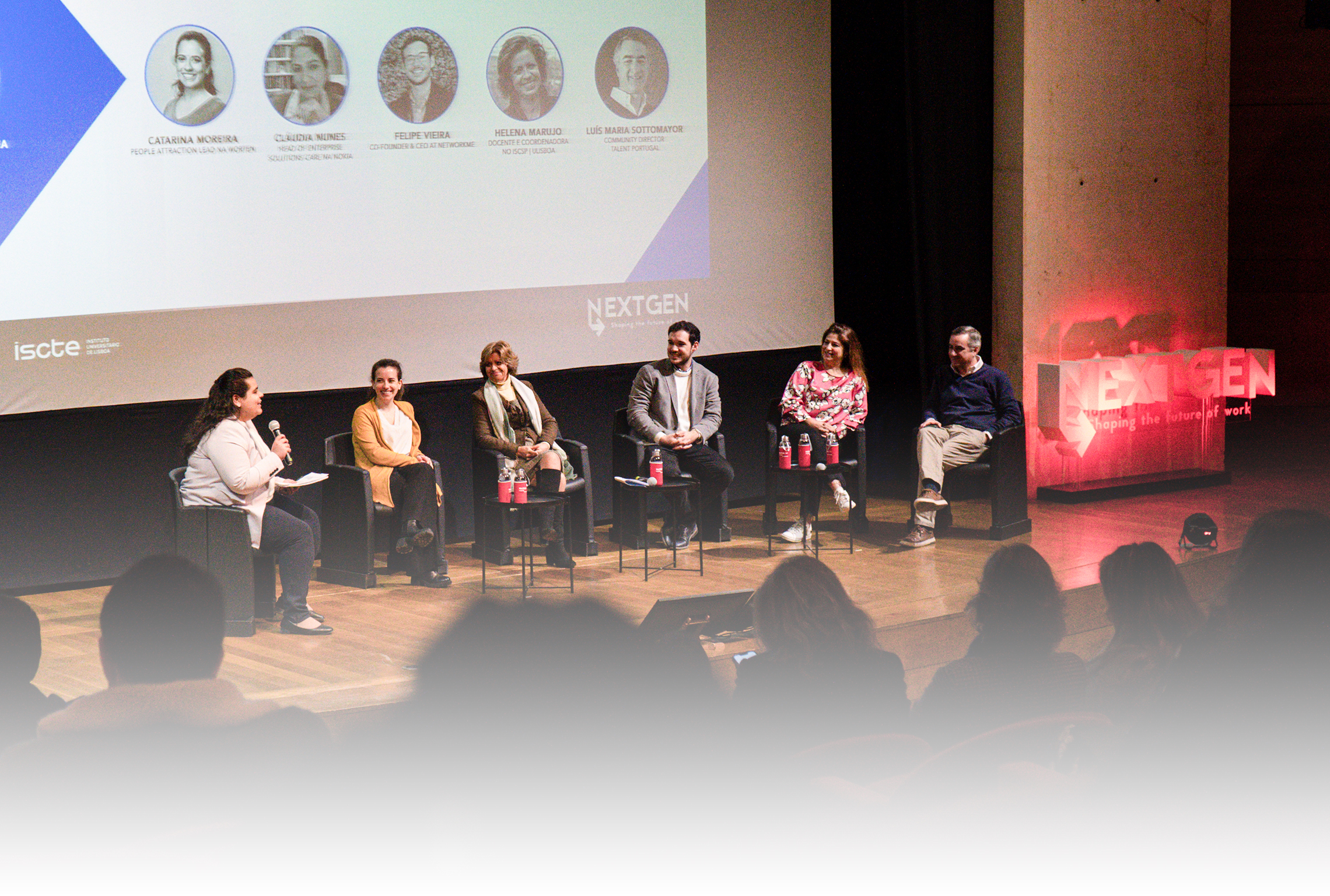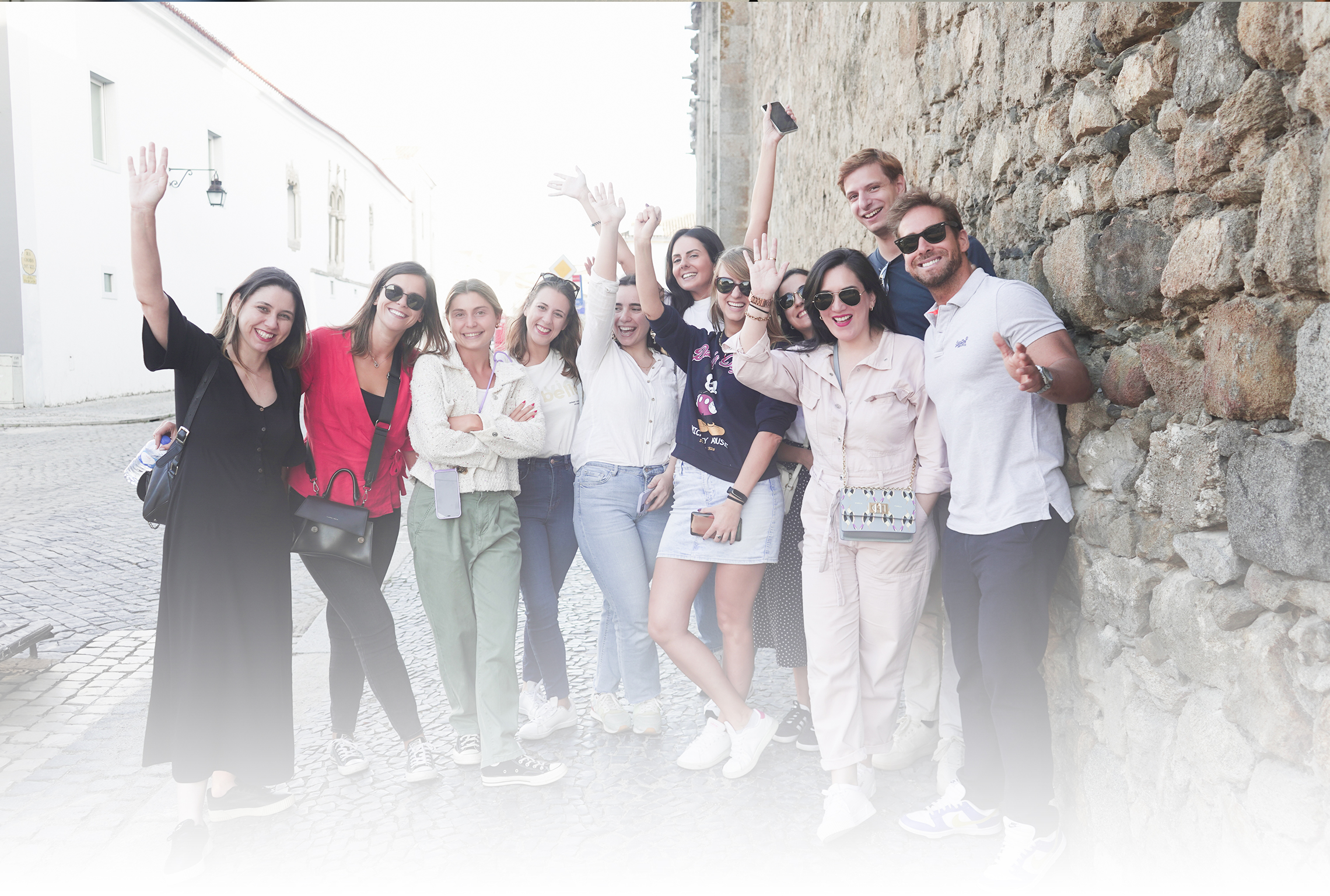NextGen: Shaping the Future of Work - a New Era
Companies need to respond to Gen Z's changing demands by focusing on good practices that attract young talent, which can benefit all generations.
Recruitment
February 15, 2023
11 minutes read

“”
I feel that the world is ephemeral for us, it’s small, it’s short. We are more conscious; we fight for diversity and inclusion, and we want companies to reflect that. We want companies to show social responsibility.
At our recent conference, powered by Prime Group and ISCTE Business School, “NextGen: Shaping the future of work”, we brought together academics, companies, and members of Gen Z to discuss the challenges and opportunities presented by Generation Z’s arrival in the workforce.
Through a series of two engaging talks and three interactive roundtables, attendees gained valuable insights into how companies are responding to Gen Z’s changing demands and what the future of work may look like for this emerging generation, and to all generations that will share the workspace with them.
Key-takeways
Generation Z, the first generation of digital natives, is entering the workforce with unique expectations and attitudes towards work. They seek deeper meaning and want to feel fulfilled in their work.
Companies need to respond to Gen Z’s changing demands by focusing on good practices that attract young talent, which can benefit all generations. The main question for companies, leaders, and recruiters is not only how to attract Gen Z, but also how to retain young talent.
Born in the midst of the 1990s and the beginning of the 2010s, Gen Z is poised to make a significant impact on the future of work, in fact, we can already feel this impact today. As this demographic continuously enters the workforce, their unique expectations and attitudes towards work are shaping the way companies approach talent acquisition and management.
How do generational changes impact and create challenges in organizations?
Given by ISCTE’s Prof. Generosa do Nascimento, this talk focused on characterizing Gen Z among the landscape of generations that presently share the workspace with them.
Gen Z is the first generation of digital natives, the first generation to grow up with the internet and technology as a permanent reality in their lives. But how does this affect their reality? “It’s a generation that likes to hang out with colleagues, but truly enjoys their own space. It’s a generation that fights for an extant communication, but, if possible, at a distance. It’s a generation that has the capability to see the world the others are feeling.”, as put by Prof. Generosa do Nascimento.
How can we respond to Gen Z’s expectations about the job market?
NextGen’s first talk, moderated by Prime Group’s Executive Director, Daniela Costa, and counting on the participation of Marcelo Santos, Young RH Talent 2022, Tomás Santos, ISCTE’s Junior Consulting President, and João Aguilar ISCTE’s Student Union President, was an opportunity to learn from Gen Z themselves what are their expectations and demands when entering the workforce – what do they bring to the table, and how they differ from previous generations?
“Above all else, I will try to demystify Gen Z, because sometimes, with this name, it feels like we’re not human.”, started Tomás Santos, ISCTE’s Junior Consulting President, and added “Generation Z, like all generations before, is the reflection of the teachings and learnings of their parents, and their teachers. Likewise, Gen Z echoes what the generations that came before wanted from the job market.”
There are no doubts that Gen Z is entering the workforce and bringing new expectations to the table, due to the time period when they made, or are making, the transition into working – in a post Covid-19 pandemic world. Remote work, work-life balance, even the four-day workweek, are not over the top demands for a young person living in 2023. Just like Tomás said, this is a reflection of what the older generations want from the job market and are only now achieving.
What are the do’s and don’ts in the attraction of Gen Z?
The second panel was moderated by Margarida Salsinha, National Team Leader at Future, and counted on five accomplished professionals, Felipe Vieira Co-Founder and CEO at Networkme, Luis Sottomayor, Community Director at Talent Portugal, Claúdia Nunes Global Head of Enterprise Solutions CARE at Nokia, Catarina Moreira People Attraction Lead at Worten, and Prof. Helena Marujo, Professor and Coordinator at ISCSP. This roundtable focused on bringing to the table good practices that organizations can adopt to attract young talent.
In a study presented by ISCSP’s Prof. Helena Marujo, a participant in the second roundtable, focused on the “Do’s and Don’ts in the Attraction of Gen Z”, that was conducted throughout Europe, showed that “Millennials have much more desire to be in the digital space than Gen Z, who longs to be in relational spaces, with the condition that the relationships are truly bounded in the realization of potential, realization of knowledge, valorization, alignment, and consistency.” Which further validated Tomás’s statement, we are not that different. Furthermore, everyone across generational gap can benefit from prospects imposed by Gen Z.
This notion of deeper meaning in the workspace was supported by Marcelo Santos, who, when asked how their generation differs from the ones who came before, answered: “I feel that the world is ephemeral for us, it’s small, it’s short. We are more conscious; we fight for diversity and inclusion, and we want companies to reflect that. We want companies to show social responsibility.”
Upon arriving on the conclusion that Gen Z does not expect much more than the other generations in the workforce today, we cannot forget that they do expect a deeper meaning in their work, and they expect to feel fulfilled, which allows them to transform their expectations into demands.
However, the main question still posed: What can companies, leaders, and recruiters do, not only to attract Gen Z, but also to retain young talent? That was a question greatly aggravated by a remark from João Aguilar, participant in the first roundtable, that stated: “My great struggle is trying to understand what I want to be when I grow up. (…) I feel like there is a lot of job opportunities in my area, but is that what I want to do for the rest of life?”
What is the value of career for Gen Z?
This final remark given by João was further justified by Prof. Mário Ceitil, who presented what is says to be the defining element that unquestionably describes Gen Z – “While before the conception around career was completely centered on the perspective that the company was entirely responsible for a person’s career, and the person resumed to adapt to their career, today, the idea is the polar opposite – each person is the protagonist of their own career.”
So, what is the answer? How can organizations adapt to this new career conception? Luis Sottomayor, Community Director in Talent Portugal, who participated in the second roundtable, identified high rates of turnover as the main challenge faced by companies today. He stated: “employee retention is a more important problem than attraction, because it has costs”.
Organizations tend to have a recruitment-centric approach when it comes to young talent acquisition, but employee retention is not out of the picture for Gen Z, like Tomás Santos said, “Sometimes we don’t need to leave our company. Through internal recruitment opportunities, we can change area, change departments, without sacrificing the company.”
What are the challenges of leadership in the present generational transition?
The third and final roundtable brought together four leaders from companies that are applying changes and pioneering the adaptation of the work environment to the new business reality. Alexandra Lemos, Premium Coaching’s CEO, Gonçalo Hall, NomadX’s CEO, Sérgio Vieira, Bizay’s CEO, Rita Fontinha, Director of the World of Work Institute (Felxible Working) at Henley Business School, moderated by Cristina Barros, Managing Director at IRH.
Gonçalo Hall took it one step further in saying that companies should align their expectations with their employee’s personal mission, which some companies in Portugal are already doing with digital nomads, stating it as the “humanization of work”. “What we offer our employees is not general anymore. Some people are not motivated by money, to some motivation might be a trip, a weekend getaway with their children (…) different things to different people.”
What is the main take away that organizations should take from these insightful participations? “Gen Z wants to be heard.” Gen Z is fast-paced and not afraid to change, as long as that change fulfils them – they long for something deeper and more meaningful from their jobs, and they are sensitizing all generations to embark on this workforce-shaping journey with them.
NextGen: What can we expect for the future?
The main take away from the first rendition of “NextGen: Shaping the future of work” is that the job market will not remain the same, and even though we have experienced many changes in the past years, many more are yet to come.
This being said, many questions are still left to be answered, and many more will arise. Gen Z is only the beginning of the future of work, as Prof. Generosa do Nascimento so eloquently reminded us, “in short years Generation Alpha will be taking internships in our organizations” – let’s pave the way.







